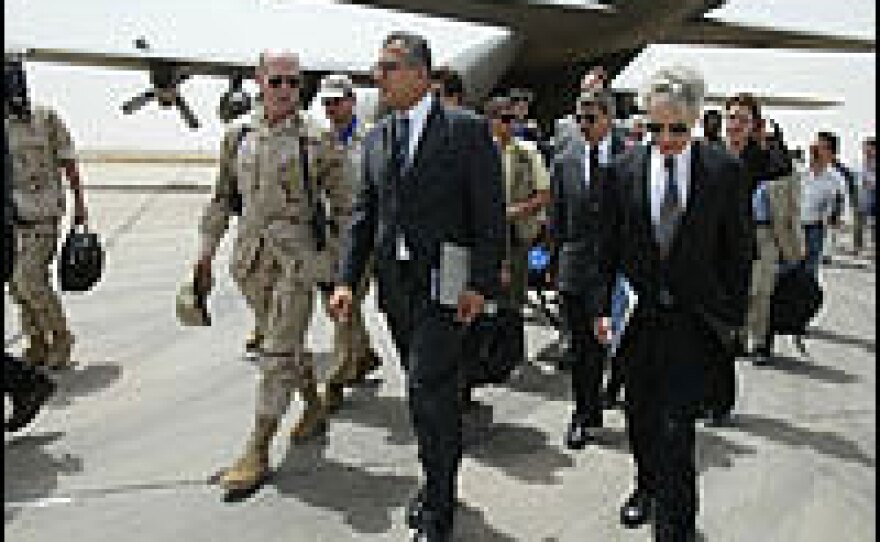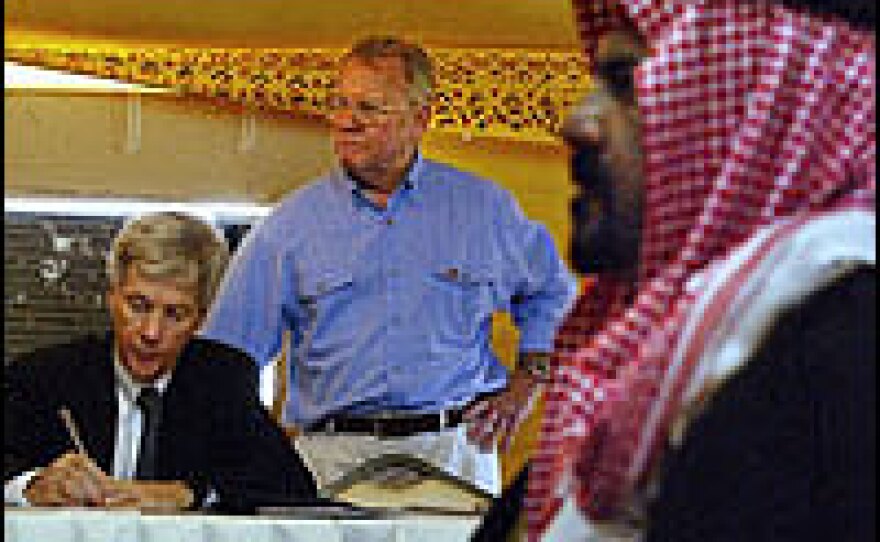

President Bush has chosen Ryan Crocker to be the next top U.S. diplomat in Iraq. The challenging post is in Baghdad's Green Zone — the fortressed compound that's under constant mortar attack. But this is business as usual for the current ambassador to Pakistan.
Crocker is someone who revels in doing "the dirty, hard, and dangerous jobs," says Richard Armitage, a former deputy secretary of state.
Like his military counterpart, Lt. Gen. David Petreaus, the new top general in Iraq, Crocker raised questions about the conduct of the war. Now, Crocker and Petreaus are being asked — perhaps too late — to correct it.
Despite the tall order, those who know Crocker say he and Petreaus are a perfect match. Former ambassador to Yemen Barbara Bodine described the two men as having "somewhat iconoclastic views" about the war in Iraq. Yet she was impressed to see them maintain personal integrity and professional objectivity. "That's fairly remarkable that we have two of those kinds of people going in," she says.
Crises in Beirut
Back in 1982, Crocker was a junior officer with the political section at the U.S. Embassy in Beirut when word came of a massacre — hundreds of civilians, including children, dead at two Palestinian refugee camps.
A year later, Crocker was in the American embassy in Beirut when it was bombed, leaving more than 60 Americans dead. Today he keeps a bloodied calendar in his office as a reminder of the attack.
Crocker served in Iran in the early 1970s and in Iraq just after Saddam Hussein came to power. He later served in Syria and Afghanistan and is currently the U.S. ambassador to Pakistan.
These posts have given him an expertise that few diplomats possess. Armitage describes Crocker as "one of our lead planners in the [State] Department for things Iraqi."
Problems Foretold
In late 2002, as the administration prepared for war, Crocker identified problems that would later come to pass. According to Armitage, Crocker wrote a memo identifying elements that would lead to trouble after an invasion of Iraq: lack of a homogeneous population, the sectarian strains, and the tribal nature of the society. Five years later, Armitage describes the memo as being "dead on the money."
Despite Crocker's pre-war concerns, his friend and colleague Barbara Bodine says the ambassador can't properly be called a "critic."
"He will give you his honest judgment," she says, but "if the policy decision goes the other way, he will then try to implement it in the very best way that is possible."
After the invasion, Crocker was posted in Baghdad, where he ran the Coalition Provisional Authority's political reconstruction team.
"He probably knew more about Arab world politics than anybody else in the Green Zone at that time," says Rajiv Chandrasekaran, who was then The Washington Post's Baghdad bureau chief. "But past experience was no guarantee of future performance in post-Saddam Iraq."
Early Mistakes
One of Crocker's missteps involved the creation of Iraq's first governing council. Seats were distributed along ethnic lines, with Shiites in the majority. Inside the Green Zone, that might have seemed fair. However, according to Chandrasekaran, many Iraqis identify the Shiite-majority governing council as one of the early mistakes that yielded today's sectarian tension.
Yet Chandrasekaran acknowledges that Crocker did not have the final say in many of the decisions:
"Though Ryan possessed a preeminent knowledge," Chandrasekaran says, "he did not possess a preeminent position of influence."
If they are confirmed, Crocker and Petreaus will be sent to fix the troubled post-war situation that they warned of four years ago. Bodine wonders where the United States might be today, had Crocker and Petreaus been appointed earlier in the war.
"It will be one of the inevitable speculations of history," she says.
Copyright 2022 NPR. To see more, visit https://www.npr.org. 9(MDAzMjM2NDYzMDEyMzc1Njk5NjAxNzY3OQ001))






